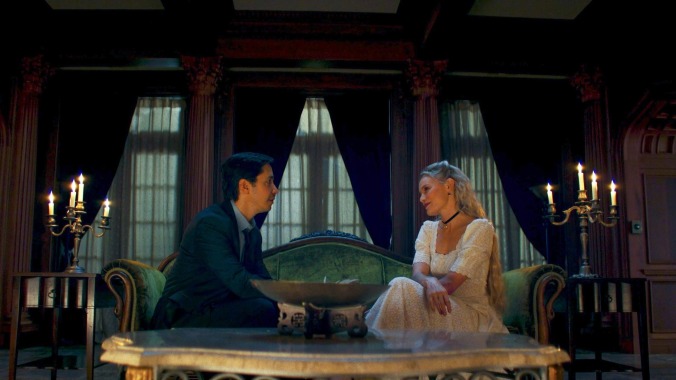In House Of Darkness, Justin Long and Kate Bosworth illuminate little about men, women, or anything else
In The Company Of Men writer-director Neil LaBute's latest touches on gender dynamics but develops no new ideas—much less an actual story

House Of Darkness is barely a movie. It may be coherent and watchable—certainly not the mesmerizing trainwreck of his earlier remake of The Wicker Man—but writer-director Neil LaBute’s barely-movie fails because it’s strangely bereft of ambition, featuring slight conflict, a nominal payoff, and virtually nothing to say, despite an onslaught of dialogue. In fact, the only seeming purpose of the film is to demonstrate that LaBute can make one on what is obviously a severely limited budget.
The film opens as a man (Justin Long) drives a beautiful woman (Kate Bosworth) home from a bar. Upon their arrival, he discovers that she lives in a gothic mansion, complete with ominous, unreliable light fixtures, but her invitation inside hints seductively that he’ll have an exciting night to brag later about with his friends. But it quickly becomes apparent that there’s more going on here than a midnight rendezvous.
One thing that House Of Darkness delivers is first-act intrigue, as the cat-and-mouse conversation between the two leads proves engaging enough to distract them—and the audience—from the fact that they haven’t mentioned their names in almost thirty minutes of the film. Long imbues “Hap” with the stuttering insincerity of a man trying to get laid, while Bosworth’s ethereal “Mina” proves seductive while exposing contradictions in the game he pitches. Dialogue makes explicit the subtext that Hap is a liar, and that Mina seeks only the truth—though she proves coy about where that truth leads. Nevertheless, it’s an effective set-up that might have been capitalized upon in a better film.
But by the dawn of the second act, LaBute’s shtick already begins to wear thin. The arrival of Mina’s sister Lucy (Gia Crovatin) sets up the opportunity for plot movement, but all it leads to is a tour of the mansion, and another woman for Hap to flirt with. Hap eventually finds himself tied to a chair in a network of tunnels, but his situation turns out to be a dream. With little else transpiring in the film, you’d be forgiven for guessing it might have been shot purely to provide the trailer with some action to entice potential viewers.

 Keep scrolling for more great stories from A.V. Club.
Keep scrolling for more great stories from A.V. Club.